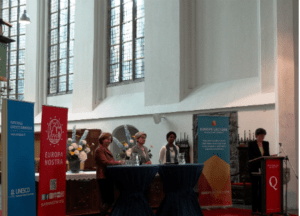UNESCO’s Director-General: “The protection of heritage has become a humanitarian imperative and a security issue”
We are delighted to inform you that the full press release prepared by Europa Nostra was posted this morning on the UNESCO website.

PRESS RELEASE
“The destruction of heritage is inseparable from the persecution of people. This is why we consider the protection of cultural heritage today as far more than a cultural issue. This has become a humanitarian imperative, and a security issue,” stated UNESCO’s Director-General Irina Bokova yesterday in The Hague during the Europe Lecture 2016, organised by the European Lecture Foundation in collaboration with Europa Nostra and the Netherlands National Commission for UNESCO. The event, held during the Dutch Presidency of the EU, gathered some 300 people at the Klosterklerk and was honoured by the presence of H.R.H Princess Laurentien of the Netherlands. Judge Silvia Fernández de Gurmendi, President of the International Criminal Court, Sada Mire, a Somali Archaeologist and Researcher at Leiden University, and Sneška Quaedvlieg-Mihailović, Secretary-General of Europa Nostra, Europe’s leading heritage organisation headquartered in The Hague, contributed to this year’s Europe Lecture. The opening remarks were made by City Councilor Ingrid van Engelshoven.
In her address, Bokova classified the acts of deliberate destruction of heritage sites and “cultural cleansing”, which have taken place mainly in the Middle East and Africa, as “war crimes”. She spoke about UNESCO’s recent actions to put culture and heritage on the frontline of peacebuilding and humanitarian emergency operations; stressed the need to combine ‘hard power’ with legislative, educational and training measures to protect our shared heritage from terrorism and looting; and highlighted the close cooperation with the European Union, especially with the Netherlands.
“Our efforts are bearing fruit. ‘Blood antiquities’ have been seized all across the globe, smugglers have been arrested, statues have been returned to Iraq, to Libya, to Egypt, to Syria,” said Bokova. The first suspect of the destruction of the Mausoleums of Timbuktu in Mali has been transferred to the International Criminal Court in The Hague and the trial should take place during this summer. “This sends a resounding message against impunity, including today in Syria and Iraq,” noted UNESCO’s Director-General.
In her address, UNESCO’s Director-General singled out the effective cooperation with the European Union. She welcomed the adoption of the EU’s New Strategy on Cultural Diplomacy, highlighting the strong vision that culture and heritage are at the centre of international relations, on 8 June, and referred to UNESCO’s high-level Conference on the ‘Protection of Heritage as a Force for Resilience and Peacebuilding’ held on 9-10 June in Brussels,
Reacting to Bokova’s speech, Judge Silvia Fernández de Gurmendi, stated: “More needs to be done to enlarge participation in the Rome Statute and enable the ICC to investigate and prosecute the most serious crimes wherever they occur, including the destruction of cultural property. We need States,civil society and organisations to all work together to underline the importance of justice and the rule of law in protecting the common heritage of humankind”, the ICC President said, thanking UNESCO and the United Nations for their invaluable support of the Court.
Referring to two important initiatives announced by the European Commission this semestre, the EU’s New Strategy on Cultural Diplomacy and the proposal to hold a European Year of Cultural Heritage in 2018, Europa Nostra’s Secretary General Sneška Quaedvlieg-Mihailović emphasised: “These two initiatives represent true milestones for Europe and for its relationship with the rest of the world. They recognize that cultural heritage is a strategicresource for Europe, both for EU’s internal policies and for EU’s external relations. They also provide a suitable platform for European and international institutions, together with various public bodies and civil society, to join forces; to respond in a positive and effective way to so many challenges which our heritage faces, not only in times of conflict, but also in times of peace.
“Together with our President, Maestro Plácido Domingo, who is also UNESCO Goodwill Ambassador, Europa Nostra and our wide network of committed organisations and individuals stand ready to contribute to this vital process,” noted Sneška Quaedvlieg-Mihailović, who moderated the Europe Lecture 2016.
For complete press release, speeches & photos, please visit:
